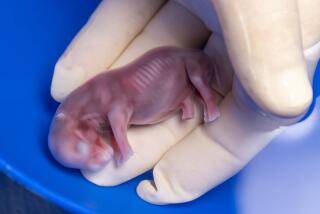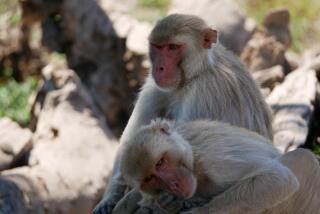Oregon Scientists Report Cloning Monkeys
Oregon researchers revealed Saturday that they had cloned monkeys from embryos, an achievement that suggests the cloning techniques developed in sheep at Scotland’s Roslin Institute may be readily transferable into other species, including humans.
The revelation suggests that there are probably many other such experiments underway around the world, and that such reports could become quite common in the months ahead.
Only a week ago, biologist Ian Wilmut shocked the scientific world by announcing that his team had successfully cloned an adult sheep, the first time such a feat had been accomplished in mammals.
But a year ago, in a much less widely recognized paper, Wilmut had reported cloning sheep from embryos--an achievement that, scientifically, was every bit as difficult and exciting as cloning an adult mammal.
The Oregon scientists said Saturday that they used techniques virtually identical to those described last year by Wilmut to clone two monkeys, one male and one female. The two are now 7 months old and “seem totally normal,” embryologist Don Wolf of the Oregon Health Sciences Research Center said.
Other than chimpanzees and orangutans, monkeys are the primates that are genetically closest to humans, and reproductive technology developed in them is usually readily transferred into humans.
“It demands that we take seriously the issue of human cloning,” ethicist Arthur Caplan of the University of Pennsylvania told the Washington Post, which broke the story.
The cloning has not yet been reported in a scientific journal.
The Oregon researchers said they do not plan to clone adult monkeys, although the technique could probably be readily adapted to do so.
“This is really an effort to see if we can create genetically identical monkeys for research,” Wolf said. Testing of new drugs and other medical developments could be done with fewer cloned monkeys than wild ones because their identical inheritance would eliminate the genetic variability that often confounds such experiments, he said.
“It would allow you to ask questions with fewer animals,” Wolf said.
The Oregon team created several normal monkey embryos in the eight-cell stage, using conventional in vitro fertilization techniques, combining sperm and eggs in a laboratory dish.
Once the fertilized eggs had grown into small embryos, the researchers took one cell from each of them and fused each with an egg whose own DNA had been removed. Nine such cells developed into embryos and each was implanted into a surrogate mother. Three of the nine mothers became pregnant, but one fetus died before birth.
The two animals that were born were thus brother and sister because the sperm and eggs from which they were created came from the same parents. However, they are not identical to each other.
If their success rate improves somewhat, the team said, the technique could be used to make eight or more genetically identical monkeys.






